| Listing 1 - 10 of 241 | << page >> |
Sort by
|
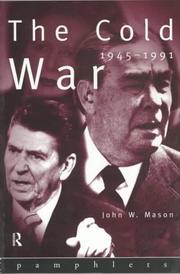
ISBN: 0415142784 9780415142786 Year: 1996 Publisher: London Routledge
Abstract | Keywords | Export | Availability | Bookmark
 Loading...
Loading...Choose an application
- Reference Manager
- EndNote
- RefWorks (Direct export to RefWorks)
International groups --- Cold War. --- World politics --- Cold War --- 1945 --- -World politics - 1945 --- -Cold War --- -International groups --- World politics - 1945
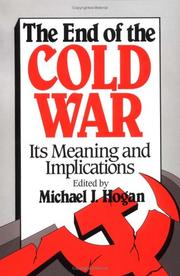
ISBN: 052143128X 0521437318 0511881770 0511625707 9780521437318 9780511625701 9780521431286 Year: 1992 Publisher: Cambridge Cambridge University Press
Abstract | Keywords | Export | Availability | Bookmark
 Loading...
Loading...Choose an application
- Reference Manager
- EndNote
- RefWorks (Direct export to RefWorks)
This collection of essays, first published in 1992, offers a serious effort to examine the end of the Cold War, its meanings and implications. The book presents the thinking of leading historians, political scientists, policy analysts, and commentators from the United States, Great Britain, Germany, France, Norway, and the former Soviet Union. Together they discuss such important issues as the origins of the Cold War, its ideological and geopolitical sources, the cost of that epic conflict, its influence on American life and institutions, its winners and losers.
International groups --- Cold War --- Guerre froide --- Koude oorlog --- Oorlog [Koude ] --- World politics --- 1989 --- -Cold War --- Social Sciences --- Political Science --- World politics - 1989 --- -Cold War. --- Cold War.
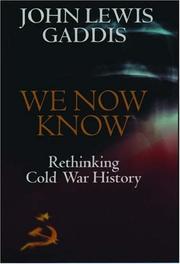
ISBN: 0198780702 Year: 1997 Publisher: Oxford Clarendon
Abstract | Keywords | Export | Availability | Bookmark
 Loading...
Loading...Choose an application
- Reference Manager
- EndNote
- RefWorks (Direct export to RefWorks)
World history
---
International groups
---
Cold War
---
#BIBC:ruil
Book

ISBN: 9780226324159 9780226046631 9780226046778 022604677X 022604663X Year: 2015 Publisher: Chicago, Ill. The University of Chicago Press
Abstract | Keywords | Export | Availability | Bookmark
 Loading...
Loading...Choose an application
- Reference Manager
- EndNote
- RefWorks (Direct export to RefWorks)
Polemology --- Cold War. --- World politics --- Cold War --- Reason --- Rationalism --- Game theory --- Philosophy. --- Political aspects.
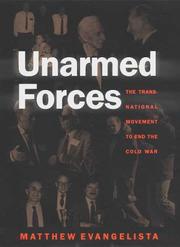
ISBN: 0801436281 1501724002 9781501724008 Year: 1999 Publisher: Ithaca, N.Y. Cornell University Press
Abstract | Keywords | Export | Availability | Bookmark
 Loading...
Loading...Choose an application
- Reference Manager
- EndNote
- RefWorks (Direct export to RefWorks)
Throughout the Cold War, people worldwide feared that the U.S. and Soviet governments could not prevent a nuclear showdown. Citizens from both East-bloc and Western countries, among them prominent scientists and physicians, formed networks to promote ideas and policies that would lessen this danger. Two of their organizations-the Pugwash movement and the International Physicians for the Prevention of Nuclear War-won Nobel Peace Prizes. Still, many observers believe that their influence was negligible and that the Reagan administration deserves sole credit for ending the Cold War. The first book to explore the impact these activists had on the Soviet side of the Iron Curtain, Unarmed Forces demonstrates the importance of their efforts on behalf of arms control and disarmament. Matthew Evangelista examines the work of transnational peace movements throughout the Khrushchev, Brezhnev, and Gorbachev eras and into the first years of Boris Yeltsin's leadership. Drawing on extensive research in Russian archives and on interviews with Russian and Western activists and policymakers, he investigates the sources of Soviet policy on nuclear testing, strategic defense, and conventional forces. Evangelista concludes that transnational actors at times played a crucial role in influencing Soviet policy-specifically in encouraging moderate as opposed to hard-line responses-for they supplied both information and ideas to that closed society. Evangelista's findings challenge widely accepted views about the peaceful resolution of the Cold War. By revealing the connection between a state's domestic structure and its susceptibility to the influence of transnational groups, Unarmed Forces will also stimulate thinking about the broader issue of how government policy is shaped.
International movements --- International groups --- Cold War --- Guerre froide --- Koude oorlog --- Oorlog [Koude ] --- World politics --- Cold War. --- Politique mondiale --- 1989 --- -Cold War --- History - General --- History & Archaeology
Book
ISBN: 0333695917 9780333695913 Year: 1999 Publisher: Basingstoke Macmillan
Abstract | Keywords | Export | Availability | Bookmark
 Loading...
Loading...Choose an application
- Reference Manager
- EndNote
- RefWorks (Direct export to RefWorks)
International groups --- Cold War --- Propaganda, International. --- Guerre froide --- Propagande internationale
Book
ISBN: 9781936488605 9781936488988 Year: 2013 Publisher: Washington, D.C. WND Books
Abstract | Keywords | Export | Availability | Bookmark
 Loading...
Loading...Choose an application
- Reference Manager
- EndNote
- RefWorks (Direct export to RefWorks)
DISINFORMATION --- INTELLIGENCE SERVICE--COMMUNIST COUNTRIES --- COLD WAR --- Polemology --- Mass communications
Book
ISBN: 068911740X Year: 1987 Publisher: New York Atheneum
Abstract | Keywords | Export | Availability | Bookmark
 Loading...
Loading...Choose an application
- Reference Manager
- EndNote
- RefWorks (Direct export to RefWorks)
COLD WAR --- World history --- International groups --- anno 1940-1949
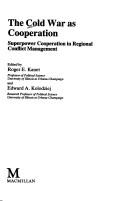
Abstract | Keywords | Export | Availability | Bookmark
 Loading...
Loading...Choose an application
- Reference Manager
- EndNote
- RefWorks (Direct export to RefWorks)
Cold War --- World politics --- International groups --- World history
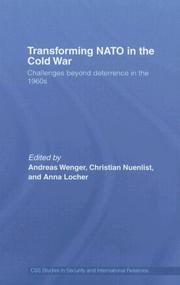
ISBN: 0415397375 9780415397377 9780203088845 9781134152940 9781134152988 9781134152995 9780415512541 Year: 2007 Publisher: London Routledge
Abstract | Keywords | Export | Availability | Bookmark
 Loading...
Loading...Choose an application
- Reference Manager
- EndNote
- RefWorks (Direct export to RefWorks)
The first comprehensive history of NATO in the 1960s, based on the systematic use of multinational archival evidence. This new book is the result of a gathering of leading Cold War historians from both sides of the Atlantic, including Jeremi Suri, Erin Mahan, and Leopoldo Nuti. It shows in great detail how the transformation of NATO since 1991 has opened up new perspectives on the alliances evolution during the Cold War. Viewed in retrospect, the 1960s were instrumental to the strengthening of NATO's political clout, which proved to be decisive in winning the Cold War even more so than NATO's defense and deterrence capabilities. In addition, it shows that NATO increasingly served as a hub for state, institutional, transnational, and individual actors in that decade. Contributions to the book highlight the importance of NATO's ability to generate "soft power", the scope and limits of alliance consultation, the important role of common transatlantic values, and the growing influence of small allies. NATO's survival in the crucial 1960s provides valuable lessons for the current bargaining on the purpose and cohesion of the alliance. This book will be of much interest to students of international history, Cold War studies and strategic studies.
World history --- International groups --- NATO --- Cold War. --- North Atlantic Treaty Organization --- History --- Cold War.North Atlantic Treaty OrganizationHistory
| Listing 1 - 10 of 241 | << page >> |
Sort by
|

 Search
Search Feedback
Feedback About UniCat
About UniCat  Help
Help News
News